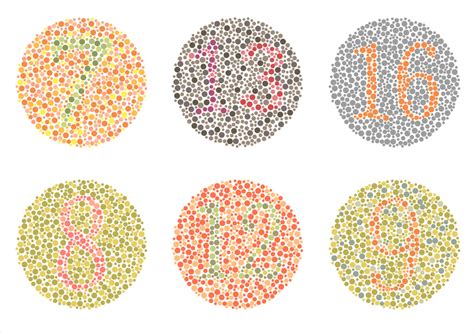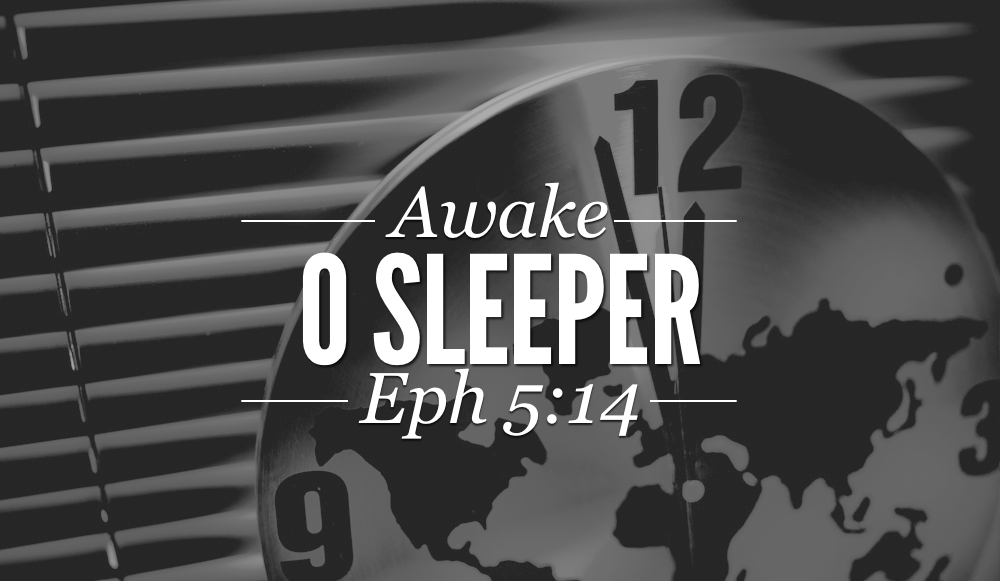This is an adaptation of the sixth talk from a 2022 sermon series — you can listen to it as a podcast here, or watch it on video. It’s not unhelpful to think of this series as a ‘book’ preached chapter by chapter. And, a note — there are lots of pull quotes from various sources in these posts that were presented as slides in the sermons, but not read out in the recordings.
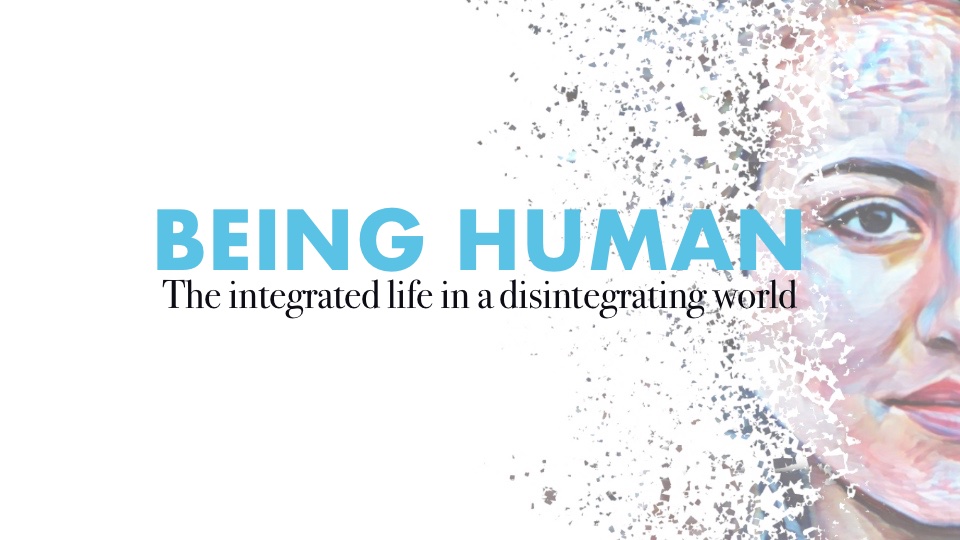
How does this image make you feel? Is your stomach rumbling?

What about this one? Are you salivating just a little?

And what about this one — can you imagine sitting in this lounge room?

How about this kitchen? How does it make you feel about your house?

It’s interesting — isn’t it — the way images work in our minds to create desires.
I could have shown you images of beautiful people — but I’m trying to keep things PG and these pictures of food came from the #foodporn and #houseporn hashtags on Instagram.
It’s not just Instagram that stokes our desire for food or furniture — you can have your senses tantalised on MasterChef, or My Kitchen Rules — and you can cultivate dissatisfaction with your kitchen appliances on The Block.
The Block had extra drama in 2022, with a couple bailing after one episode; because it wasn’t on-brand for them — it didn’t mesh with their image; Elle Ferguson’s in the image business… she’s a world-famous Instagram influencer. Being an influencer is a desirable new career path; the ABC is even reporting on children becoming professional influencers — and how powerful these influencers are.
It’s a tricky life. Aussie academic, Nina Willment, says influencers live with the constant threat of not being seen; if they don’t keep making content they might be punished by the machine overlords — the algorithm.
“The threat of invisibility is a constant source of insecurity for influencers, who are under constant pressure to feed platforms with content. If they don’t, they may be ‘punished’ by the algorithm – having posts hidden or displayed lower down on search results.”
Nina Willment, The Dark Side of Content Creation
But it’s not just influencers who reduce themselves to images and perform for a machine-like audience; in the age of expressive individualism, Instagram’s on hand inviting you to express yourself with the tools they provide.
Image making is part of being human; it’s what God does, and it’s part of images made in the image of an image maker (Genesis 1:27).
The catch is, when we live as images in a world where we have cut ourselves off from God — where we’re “buffered” — we’re not sure what image it is we’re meant to be like, and so we often end up choosing other people… And often it’s not just our parents, in our visual culture it’s celebrities — or, increasingly, influencers.
Christopher Hedges wrote the book Empire of Illusion, about life in a world dominated by images that are produced to manipulate us and keep us playing along with the image makers; the celebrity-making machines, and he says when we turn to celebrities — or influencers — as idealised forms of ourselves, it ends up impacting us; instead of being fully real, or fully self-actualised, we’re never sure who we are.
“Celebrities are portrayed as idealized forms of ourselves. It is we, in perverse irony, who are never fully actualised, never fully real in a celebrity culture.”
Christopher Hedges, Empire of Illusion
Maybe we’re not buffered selves, but buffering — always trying to become who we are more fully, but never quite finished and ready to go.
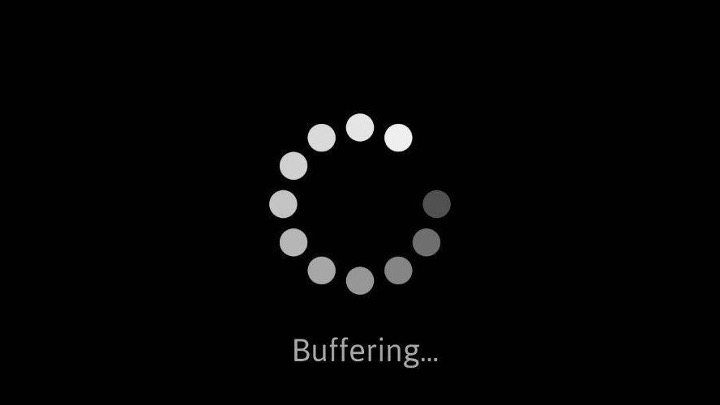
With the sheer volume of evolving images how could we feel whole? We’re perpetually looking for the next image — whether that’s a meal, a house design, a holiday, a relationship, or some visionary version of ourselves.
In an article updating the argument in his book after Donald Trump’s election — Hedges says we’re worshippers of the electronic image — our modern-day idols shape our fantasies; our hearts and our lives. Even our interactions with others are shaped by all sorts of pixelated pictures, whether that’s through interacting on screens; or spending our time seeing people’s bodies in pixelated form.
“Electronic images are our modern-day idols. We worship the power and fame they impart. We yearn to become idolised celebrities. We measure our lives against the fantasies these images disseminate.”
Hedges, Worshipping the Electronic Image
Hedges reckons Donald Trump’s reality TV instincts made him a perfect politician for the digital image world — he’s mastered the cultivation of political images — we saw this in this image during a series of FBI raids.
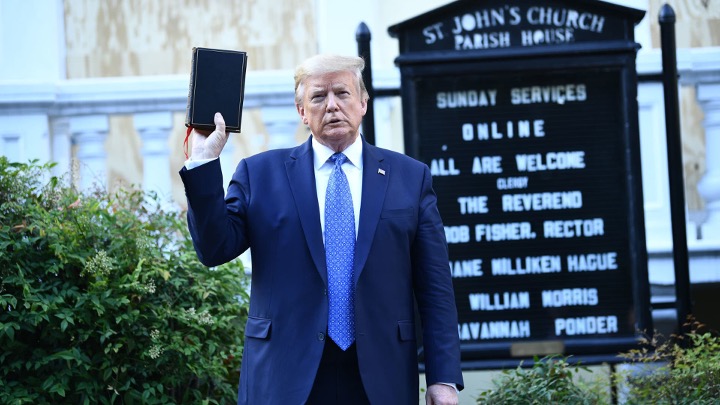
Bizarrely Trump seems to be the embodiment of all the vices from Colossians (Colossians 3:5), but his image-making machine controls the Republicans, and about 80% of people who identify as evangelical Christians in the US — and we might feel a world away, but consider how much of the imagery in our culture and on our screens is pumped out from the US…
Trump’s image-making is catching — those following his playbook can look like images in a live action role playing game, or like they’re playing multiple characters at once.

This isn’t new; we’ve always been shaped by images — once it was stained glass windows, and paintings that told the story about an enchanted cosmos, what’s new is the medium; and it’s much cheaper to make a digital photo than a stained glass window; today our icons are the pictures flashing across our screens.
“In the Middle Ages, stained glass windows and vivid paintings of religious torment and salvation controlled and influenced social behavior. Today we are ruled by icons of gross riches and physical beauty that blare and flash from television, cinema, and computer screens.”
Hedges, Empire of Illusion
And it’s not just foodporn, obviously — porn itself is embedded in our culture and our imaginations — our image making. Both as an image maker and in the way its norms flow into the way human bodies are presented in advertising and entertainment.
Hedges is a lapsed Presbyterian minister who became an award-winning war correspondent — his book has a whole chapter on porn — and it’s like he’s covering a war; it has way too much information to be comfortable reading — he reckons porn both shapes and mirrors the violence, cruelty and degradation in our society the same way war can; and that porn is producing a loss of empathy by reducing human beings — and human bodies — to being commodities.
“The violence, cruelty, and degradation of porn are expressions of a society that has lost the capacity for empathy… It is about reducing other human beings to commodities, to objects.”
Hedges, Empire of Illusion
He suggests porn is part of a society that kills both the sacred and the human, replacing empathy and human desire — eros — and compassion with power, control, force and pain — and the idea that we are gods, and others will literally bend to our fantasies…
“It extinguishes the sacred and the human to worship power, control, force, and pain. It replaces empathy, eros, and compassion with the illusion that we are gods… Porn is the glittering façade… of a culture seduced by death.”
Hedges, Empire of Illusion
And we’re seeing the costs of this society in our society — in our schools even — I read this news story about how young boys raised on porn are sexually assaulting their classmates in record numbers.
Melinda Tankard Reist from Collective Shout wrote about the impact of porn not just in assault, but in the expectations placed on teen girls in dating relationships a few years ago where she said the culture, for teens shaped by porn, is that sexual conquest and domination are untempered by the bounds of respect, intimacy, and authentic human connection — that young people are learning cruelty and humiliation not intimacy and love — this is what happens when we’re just bodies ruled by desire, or see each other just as pixelated images in the flesh, where our desires have been shaped by dehumanising images.
“Sexual conquest and domination are untempered by the bounds of respect, intimacy and authentic human connection. Young people are not learning about intimacy, friendship and love, but about cruelty and humiliation.”
Melinda Tankard Reist
The culture we live in that commodifies people by turning them into images isn’t just happening in Instagram, or porn, it’s shaping dating — our relationships are increasingly mediated by digital images. One third of all new romantic relationships now begin online, it’s the most common way people get together.
And platforms like OkCupid — who promise dating for every single person — that’s clever — and who can even cater for niches like “people who like kissing while sitting in pie.”
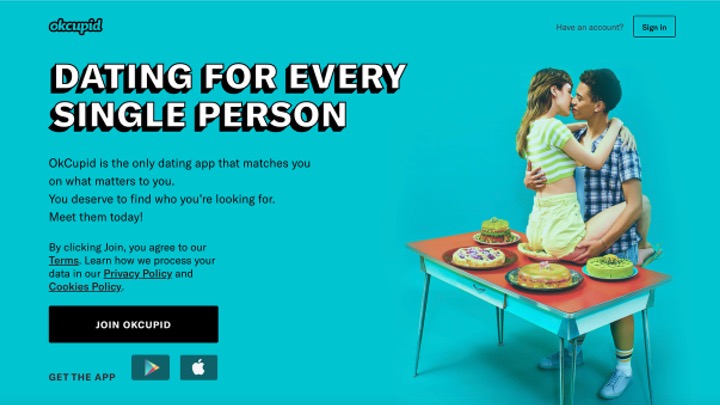
Success on these sites requires cultivating an image that’ll make you attractive to others. And pictures create heaps more interaction than words; they have run studies.
David Brooks — who writes for the New York Times — wrote an article about online dating in 2003, celebrating how it was reintroducing a formal structure and ritual to dating, which he thought had been lost:
“Online dating puts structure back into courtship. For generations Americans had certain courtship rituals.”
David Brooks, Love: Internet Style, New York Times, 2003
He reckoned these platforms were all about love…
“But love is what this is all about. And the heart, even in this commercial age, finds a way.”
Brooks, 2003
In 2015 he wrote another piece — and he had changed his tune — he noticed something about the way these platforms worked — when we go to an online dating site on the same browser they use for their online shopping, we inevitably bring the same mindset — we shop for human beings. He says these platforms commodify people particularly by reducing people to a picture.
“People who date online are not shallower or vainer than those who don’t… It’s just that they’re in a specific mental state. They’re shopping for human beings, commodifying people.”
David Brooks, ‘The Devotion Leap,’ New York Times, 2015
And this process is more or less the opposite of love.
“Online dating is fascinating because it is more or less the opposite of its object: love.”
Brooks, 2015
Things have become more complex since 2015 — dating sites like OkCupid have lost market share to apps focused on instant gratification and immediate availability; where even the rituals of the old web dating have been deconstructed with a swipe of the finger, and where image is everything.
Photography itself is interesting — it has rapidly evolved as part of everyday life since the mechanisation of camera production in the 70s; before then most people didn’t spend time taking photos; even then cameras had built-in limits — like film — but the jump from mechanical to digital means we now have a seemingly unlimited capacity to capture every moment — and then see everything on our screens.
Susan Sontag wrote a famous essay ‘On Photography‘ in the 70s where she was worried then that to capture and shoot images was an act of aggression — think of the words “capture” and “shoot.”
“There is an aggression implicit in every use of the camera.”
Susan Sontag, On Photography
Photographers, she says, are “always imposing standards on their subjects,” and objectifying them.
She saw the need — once families had cameras — to capture every moment as an addictive aesthetic consumerism.
“Needing to have reality confirmed and experience enhanced by photographs is an aesthetic consumerism to which everyone is now addicted.”
Sontag, On Photography
She suggests industrial societies turn their citizens into image junkies, and this bombardment of imagery becomes an irresistible form of mental pollution.
“Industrial societies turn their citizens into image-junkies; it is the most irresistible form of mental pollution.”
Sontag, On Photography
This was before the smartphone. Imagine how she would feel about the digital society…
Have you thought about it this way? The idea that images are polluting our brains, and shaping our desires, and reshaping our bodies — but we’re bombarded with images and these images shape our desires and produce reactions in our bodies; and we’re being discipled by our digital society — even by algorithms — to interact with images and present ourselves as images… and normally as images that keep making people more money, by stoking more desires and selling us the answer.
God made us as image bearers to see… to imagine… and to make images.
God made beauty.
He made fruit that was pleasing to the eye and good for food (Genesis 2:9); but this visualising — our capacity to imagine — either leads us to or away from God. “Pleasing to the eye” and “good for food” is how Eve sees the fruit she’s been told is not good to eat too (Genesis 3:6). Then this pattern of seeing and desiring and being led to destructive sin repeats — it’s the same story with the Nephilim (Genesis 3:6, 6:2), and with David and Bathsheba (Genesis 3:6, 2 Samuel 11:2-4).
This relationship between sin and desire is also caught up in idolatry — so the Ten Commandments include a command not to make graven images of God (Exodus 20:4-5); and Deuteronomy commands Israel to watch themselves carefully and to avoid making images of living things to worship them (Deuteronomy 4:15-18), because those images will profoundly shape our vision of God and our life in the world.
What do you think Moses would have said about Instagram?
It’s interesting, though, that Israel’s holy spaces — the tabernacle and temple — involve man-made images of trees and fruit (Exodus 25:36); Israel’s eyes and bodies are meant to participate in worship — and making beautiful images of things God made can be part of that — but you won’t find carved images of God; or of animals, or of men or women — images of images of God, because Israel weren’t to worship images; they’re to be images… as soon as we reduce God to an image, or make an image our god, we’re working with a false picture of God; a God who is an image of our making.
This tendency to turn images into gods is pretty ingrained — Ezekiel talks about idols being set up in our hearts; the seat of our desires and loves (Ezekiel 14:4-5)… That’s where images go… Isaiah re-tells an idol making session with someone cooking food over one half of a chunk of wood, then carving an image of a god with the other (Isaiah 44:15), and he says something those of us who live with our phones wedged into our hands with our eyes hunched over giving all our attention… “Is not this thing in my right hand a lie?” (Isaiah 44:20).
Are not these images that bombard me, and keep me looking down, and that shape my desires — aren’t they built on the same lies; the same call to misplace our desire, that the serpent used with Eve… Won’t they leave me always dissatisfied? Humans have always been fixated by images.
The New Testament church lived in an image-saturated world — there were statues of the emperors and the Roman gods everywhere; temples on every hill and corner in a city — they also lived in an age of spectacle that upheld the imagery; the degradation of human bodies in blood sports and sexual immorality — and this presented a major challenge for the early church;
They were pretty serious about Jesus’ commands on lust and the heart, and the idea of your eyes causing you to stumble (Matthew 5:28-29), and about his teaching on the eyes and the heart being linked (Matthew 6:21-22). For them, even attending the Roman spectacles; these games, was seen not simply as renouncing your Christian faith, but as announcing you belonged to the ancient empire of illusion. They wanted to cultivate a way of seeing the world that helped them see God, and so live as his images.
Two Aussie theologians — Ben Myers and Scott Stephens — co-wrote a paper about disciplining our eyes in a visual culture; they reckon we also live in a society of spectacle and one of our great moral challenges is deciding what images to look at.
Christians today live in a society of the spectacle. Our lives are dominated to an unprecedented degree by images and by the moral act of looking at them.
Without minimising the damage that sexual imagery does to us; they suggest all imagery is essentially pornography.
“All images today are pornographic: they arouse—but without danger, obligation, or contamination.”
Myers and Stephens, ‘The Discipline of the Eyes: Reflections on Visual Culture, Ancient and Modern,’ in HTML of Cruciform Love: Towards a Theology of The Internet
We’re so conditioned to objectify and worship — that imagery in ads and in social media streams arouse us without the danger of embodied commitment; without creating obligation, or without the complications that come when we actually use our bodies. And the spectacle shapes us.
And I know that some of us are here and we’re struggling with lust; with addiction to porn, and I’m not wanting to minimise that by saying that most of us are struggling with image addiction, in a machine world where the algorithms are geared towards ruining us by making us consumers — I don’t want to minimise it, but maybe I want to reframe the conversations about porn so that you see it as part of a dehumanising world that has objectified and commodified everything and everyone, where we’re taught that a fulfilled life is one where we satisfy our every longing and desire and that we can do this just with imagery — and maybe I think the rest of us should be confronting our own addictions too…
It’s easy for us to look across the ocean and judge the image-driven life of American politics; but ours is the same. It’s easy for us to throw stones at churches built on image, where that goes wrong — like at Hillsong’s New York campus where the image cultivation machine was operating in overdrive. But what about in our church? How do we go about avoiding the worship of images — whether that’s online, or the way we express ourselves?
This is something I’ve been pretty aware of as someone who lives online in an image-soaked world — I’ve resisted selfies, I don’t post or scroll on Instagram, I do scroll Facebook, and find myself comparing and contrasting to all sorts of people — especially other pastors. The sin of comparison will kill you just like any other. One of the ways I compare myself is that I hate when churches post photos from within a church service, especially of preachers — in a way that just creates a sort of #churchporn. Where are you engaged in image-based comparison? What spectacles can’t you turn your eyes from? What online images are shaping your hearts?
We aren’t going to think our way out of idolatrous practices that shape our desires; our loves; our worship — we actually need a new way of life; a new sort of worship and a new image to pursue.
How do we become worshipping images, where images — even the pictures on the screen — help us worship God rather than conforming our imaginations?
This, I take it, is what Paul is teaching the Colossians to do in their own world of idolatrous spectacle; he starts his letter by introducing Jesus as the image of the invisible God (Colossians 1:15-16). Jesus is the one worthy of our worship, because in him and for him all things on heaven and earth were created; and because he has redeemed us and is reconciling us to God…
And then he calls his readers away from idolatry by calling us to lift our eyes; not focusing on the images we’re inclined to worship; but because we’ve been raised with Jesus and because he’s seated at the right hand of God in heaven, and that’s our future and what should be our desire; we should fix our hearts and minds on things above (Colossians 3:1-2); and this’ll mean cultivating a new way of looking at the world.
Because we’re called to take off the old self — with its practices (Colossians 3:9-10), that’s going to include practices of seeing, as we put on a new self with new practices of seeing and worshipping, so that we’re renewed in the image of its creator — which Paul says back in chapter 1 is not just the Father, but Jesus as well.
We’re to put to death what belongs to our earthly nature (Colossians 3:5-6) — a nature shaped by worshipping earthly stuff — seeing, desiring, and taking — by how we approach sex, lust, desire, and greed — which is idolatry — and I reckon Paul’s saying the stuff that belongs to our earthly nature is idolatry — these are paths to death; to God’s wrath. So kill them.
And take up new life — clothing ourselves with compassion and kindness and humility and gentleness and patience, and forgiveness — seeing others the way God sees them — and ourselves as God sees us — and over all this; love — the virtue that binds them all (Colossians 3:12-14).
When Paul talks about practices in the world — and with others — and these virtues — these practices have to include new ways of looking at the world, and at others — we can’t look at the world, and others, as objects to be consumed — lusted after — desired. That’s deadly idolatry. That’s what porn is; it cultivates death in you — your eyes, your heart, your body are all being aligned to death — but it’s also what any idolatrous image making and image-viewing does for us; instead we should be looking at others and at the things God made in order to learn compassion and kindness and humility — self-denial — gentleness and patience — these are the virtues opposite to pornworld and the age of instant gratification; and when we embrace these new patterns of looking it should transform our community so that we are images who look like Jesus in compelling and truly human ways.
The sort of practices we’re going to need are — like last week — ascetic — cultivating the discipline not to look; to self-deny — and aesthetic — cultivating an ability to look through the goodness and beauty of created things; and to use our desires and our eyes in ways that throw us towards the one in whom all things are made and reconciled.
But we need a third practice; too — one of keeping Jesus — keeping heavenly realities before our eyes, and shaping our hearts — so that as we say no to idolatry and yes to beauty our hearts are being governed by the image we worship; the image of God. This’ll be what stops us being buffered — closed off to God — and buffering — never fully human — we become fully human as we worship God who made us, and are renewed as his image bearers.
In terms of saying no — you might need to do an audit of your image viewing; being confronted with images in an age of spectacle is inevitable, but what can you do to not just turn your eyes, but keep your eyes looking where they should be. What apps do you need to delete? Delete them now. Just say no. What social media platforms or TV shows or games or magazines are cultivating your idolatry? Step back from them until you can step into them as an image bearer captivated by Jesus.
Job has that famous line about making a covenant with his eyes not to look at a woman lustfully (Job 31:1-2) — and there’s an app you might use to fight porn called Covenant Eyes, but if all imagery is pornographic — maybe we all need to make commitments not to look lustfully at sex, or violence, or food, or symbols of wealth, or whatever it is that turns our heart… and the word lustfully here is key; it doesn’t say don’t look at beautiful people or things God made; it’s about our hearts.
Ben Myers and Scott Stephens reckon we need to — in community — cultivate visual disciplines; periods of asceticism — where we put the screens down — as necessary parts of our spiritual life.
“Do Christian communities still believe it is possible to cultivate visual disciplines, and periods of visual asceticism, as necessary parts of the spiritual life? Do we recognize the moral value of providing havens from the dominance of the image, while also nourishing alternative traditions of perception?”
Myers and Stephens
They reckon this sort of discipline is necessary to give our eyes a break.
This is one of the reasons we do so little on social media and the web as a church — there are other reasons, like not wanting to put church forward as an “image” thing to be consumed — but you don’t need your screen. And we need to cultivate other ways of using our eyes; our perception as well.
Myers and Stephens remind us that we can see one another — the faces of living saints — as part of being shaped by images, but also suggest works of art might play a part. In Christian traditions other than ours; like the ones with stained glass storytelling; people’s imaginations were formed — catechised — using pictures; art.
“Do we offer catechesis in the use of holy images, whether these are works of art or the faces of living saints?”
Myers and Stephens
We Protestants tend not to have an aesthetic, or a sense of the place of art and beauty — both making and appreciating it — in our lives as a form of discipline or disciple making; art is a life-giving alternative to the death-taking imagery of porn and advertising…
And here’s where we might cultivate what Alan Noble calls an aesthetic life as a disruptive witness to the world — a life that values and even collects beauty because beautiful things — art, poems, flowers — create an allusionary sense that the world is enchanting, in a world of illusionary images, we need these allusionary images — images that allude to the beauty and character of God as creator.
“What makes a work of art, a poem, or a flower beautiful is the way it suggests more, the way it opens up possibilities, the way it alludes to other things in creation.”
Alan Noble, Disruptive Witness
He reckons this approach to aesthetics resists commodification — recognising beauty and the creatureliness or createdness of people and things reminds us of the creator; and reminds us we’re not just commodities where nothing matters — the world doesn’t just exist for our grasping; but is shot through with meaning that we’re meant to probe, as humans.
“Aesthetics reveals an irreducible universe — a universe that resists our attempts at totalizing and controlling it, that is always just out of grasp, that always offers us a little more meaning.”
Noble
This might even involve how we decorate our homes, and the food we serve on our tables — not just with images from Instagram; where people are trying to cultivate a sense of self through performance, but images that have a more artistic and allusionary quality that pull us towards the enchanted world; it might also involve practising noticing beauty in creation without taking photos at all, connecting with God’s world — and your body — and receiving beauty with thanksgiving.
Paul’s big solution to guide us as we do this is that we let the message of Christ dwell among us richly as we teach and admonish one another — with wisdom — contemplation of God’s world and how to live in it — through creativity; through poetry — through psalms, hymns, and songs from the Spirit — songs we humans create as temples of the Spirit in response to setting our hearts on things above, and through engaging our voices and hearts as we sing to God — with gratitude in our hearts.
And his goal is that whatever we do — whatever images we make or see — as we live as renewed images — whatever we do we’re to do in the name of the Lord, giving thanks to God the Father through him. If you can’t do that when you encounter or create an image, then there’s a good chance it’s an idol (Colossians 3:15-17).

